Campus des Nations, through the implementation of the Primary Years Programme (PYP), recognises that language, our major means of thinking and communicating, is fundamental to learning, underpinning and permeating the whole curriculum. |
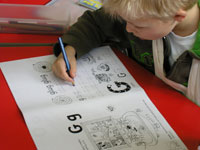 |
English as A Second (Additional) Language Learners can be classified as ‘Phase One Language Learners’ or ‘Phase Two Language Learners’. First Phase Language Learner is a term used to refer to a student who is in the beginning stage of learning English, having already acquired a language other than English. Second Phase Language Learner is a term used to refer to students who have moved beyond the beginning phase of learning English and need to work towards increasing the range, depth and proficiency of their language skills to enable them to understand academic concepts and vocabulary. A successful ESL programme is needs-based and may vary from year to year, depending on the composition of the school population. The programme is designed after careful assessment of the individual child’s knowledge of English, age, mother-tongue background and mainstream classroom situation. |
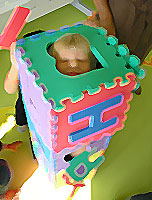 |
|
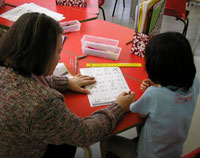 |
The
aims of the EAL programme are: |
|
| To provide intensive English language support for First Phase Learners with limited or no English. The main emphasis of the programme is to develop Basic Interpersonal Communication Skills (BICS). At this stage the learners are withdrawn from mainstream class on a daily basis. Students receive intensive language support in small groups that provide a particularly nurturing environment. The initial emphasis being on speaking and listening to develop oral communication skills. “Survival English” in the form of essential basic vocabulary is introduced and increases in complexity as the students develop individual language skills. The introduction of reading and independent writing is dependent on the readiness and level of language development of the individual student. |
To provide English language support for Second Phase Language Learners. The main focus of this programme is to develop the Cognitive Academic Language Proficiency (CALP) of the learners, for the purposes of fully integrating the student into the academic curriculum of the school. At this stage the learners may be withdrawn from the mainstream classroom to work in a small group or the ESL teacher may consider the option of working in the mainstream classroom alongside the classroom teacher. It is important to link language learning with content learning. Teaching is linked as closely as possible to the language and content relating to PYP units of inquiry taught in the mainstream classroom. The students also work on more individualised programmes to address specific language needs. As the students develop in ability, a greater emphasis is placed on writing and on providing the tools to enable students to revise and edit their own work. |
| As far as possible, withdrawal from the classroom is during times that the learner would have difficulty deriving much benefit because of language difficulties. Generally, Art, Music, Physical Education, Drama and Information Technology classes are not missed as these provide opportunities for active involvement with peers. Peer interaction is extremely important in the acquisition of language and should be maximised whenever possible. | To communicate with the parents of children who are studying English as A Second (Additional) Language and encourage them to continue the development of the child’s mother-tongue. A strong background in the mother-tongue aids the acquisition of a second language. Language acquisition does more than promote cognitive growth; inherent in the PYP approach is the belief that mother-tongue language development is crucial for maintaining cultural identity and emotional stability. |
| To work towards achieving the Language Arts learning outcomes of the PYP. | To reflect the philosophy of the International School of Geneva. The ESL students come together in a very diverse group; the group consists of students from different cultures, speaking different languages. They are united by several factors including a common goal; to learn English, and a common experience; having to cope with many new situations. In working together and learning about each other they will also learn the need for tolerance and acceptance of other’s differences in culture and learning styles. They will become open-minded, respectful and considerate for other’s rates of second or other language acquisition. |
 |
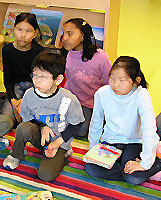 |
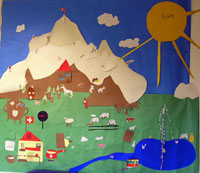 |
| Demonstrations of deeper learning in responsible behaviour through positive action and service; a manifestation in practice of the other essential elements | Powerful ideas which have relevance within and across the disciplines and which students must explore and re-explore in order to develop understanding | Significant, relevant, subject matter which students are expected to explore and know about Click here to find out more about the 6 themes Click here to find out more about the 6 subject areas
| Those things which the students need to be able to do to succeed in a changing, challenging world | Dispositions which are expressions of fundamental values, beliefs and feelings about learning, the environment and people |
updated
15 fÈvrier, 2007